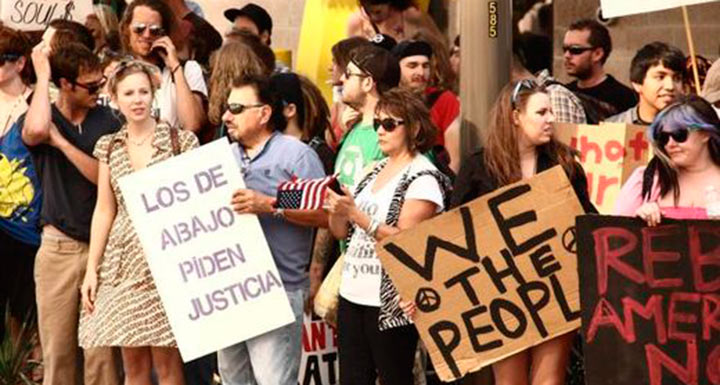
The economy is doing fine; the people not so much
Judging by the booming stock market and the record profits of U.S. corporations, the American economy is doing just fine, thank you.
True, very recently the stock market has taken a hit, but that appears to be merely what market analysts call a correction. That’s when overly-enthusiastic investors realize that some stocks are overvalued relative to returns and hit the brakes just a little. The gyrations of the stock market are inherently unpredictable, but the evidence so far does not indicate a long-term decline but rather a modest retreat from the stratospheric values recently recorded. Meanwhile, corporate profits have been soaring.
So why does a recently released survey by the U.S. central bank–the Federal reserve–indicate that so many Americans, one in four, are just scraping by five years after the Great Recession was officially declared over?
One reason is that corporations have chosen to sit on the mountains of cash their profits have brought rather than invest it in the real economy in which things are manufactured or built and jobs generated.
I am, for the most part, with Edward Sutherland, the author of the seminal book “White Collar Crime, ” a comprehensive study of corporate misdeeds in the 1920s and 1930s. He found many communalities between corporate and criminal behavior and famously concluded: “Business is crime.”
That’s a statement many people would consider outlandish. Yet, recent history, from Enron to the 2008 made-in-Wall Street economic disaster to the outrageous decision by General Motors not to recall millions of cars the company knew for years had a life-threatening ignition defect, have only bolstered Sutherland’s lapidary verdict.
But there is more to the story of why U.S. corporations have not contributed much to economic recovery. Capitalists, whether they operate entirely within legal and regulatory norms, or function in the gray area between outright lawbreaking and aggressive business practices, or conduct themselves entirely outside the realm of legal and ethical rules, only invest in the real economy where there is sufficient demand to make a profit.
Until 2008, consumer spending kept rising, but only on the basis of the real estate bubble that functioned like a gigantic credit card seemingly without a limit or an expiration date. But, unexpectedly, the expiration date arrived for most Americans when the value of real estate crashed leaving countless people, excepting the rich, with debts they could never repay and little disposable income to spend on the toys or, for a significant sector, even the necessities the real economy produces in abundance.
The giant sucking sound heard around the world was the sound of an economy driven by consumption sinking as trillions of dollars went flying out of the pockets of former consumers. Under such conditions, why invest?
This debacle has had the dire long-term consequences the Fed study lays bare for both economic and political reasons. The economic factors are virtually inevitable, at least in the short run, because when tens of millions of people cut down drastically on their spending, many of the people who made the goods those people used to buy lose their jobs. Those newly unemployed legions then respond by also cutting back radically, which leads to more layoffs in a seemingly endless death spiral.
The only way for that spiral to be stopped or at least slowed significantly is for an actor with really deep pockets to step in and spend lots of money to boost demand and create jobs. It is at this juncture where politics enters the picture. The only entity capable of breaking the vicious downward circle decisively is the government. But Republicans, who despite losing the White House twice hold virtual veto power over economic policy, especially after they won the House of Representatives in 2010, look at government spending as a cardinal sin.
Faced with an under-consumption crisis requiring government to stimulate the economy, the GOP has fought, not without success, to cut spending. Unconscionably: They have even gone after food stamps and the Women, Infants and Children’s program. The despicable moral implications aside, from a strictly economic viewpoint, the GOP’s preferred treatment for the ailing economy amounts to a doctor applying leeches rather giving a transfusion to a patient bleeding to death.
The damage done by the policy of cutting everything, including financial assistance to college students, which is an investment in human capital and the nation’s future, will last far longer and cut deeper than even the Federal Reserve study suggests.
A recent article in U.S. News and World Report, scarcely a liberal publication, points out the following:
“It turns out having a lot of student loan debt can do damage to more than just your wallet.
“A new report from Gallup found college graduates with higher levels of student loan debt were less likely to be thriving physically, to have a good sense of purpose and to be involved in their communities. This is on top of the toll it’s known to take on a person’s finances.”
The disconnect between the record Wall Street values and corporate profit figures on the one hand, and the sorry economic situation of so many Americans on the other, reminds of an infamous pronouncement by a Brazilian general during the military dictatorship in that country. I paraphrase from memory: “The economy is doing fine. It’s the people that are not doing well.”

